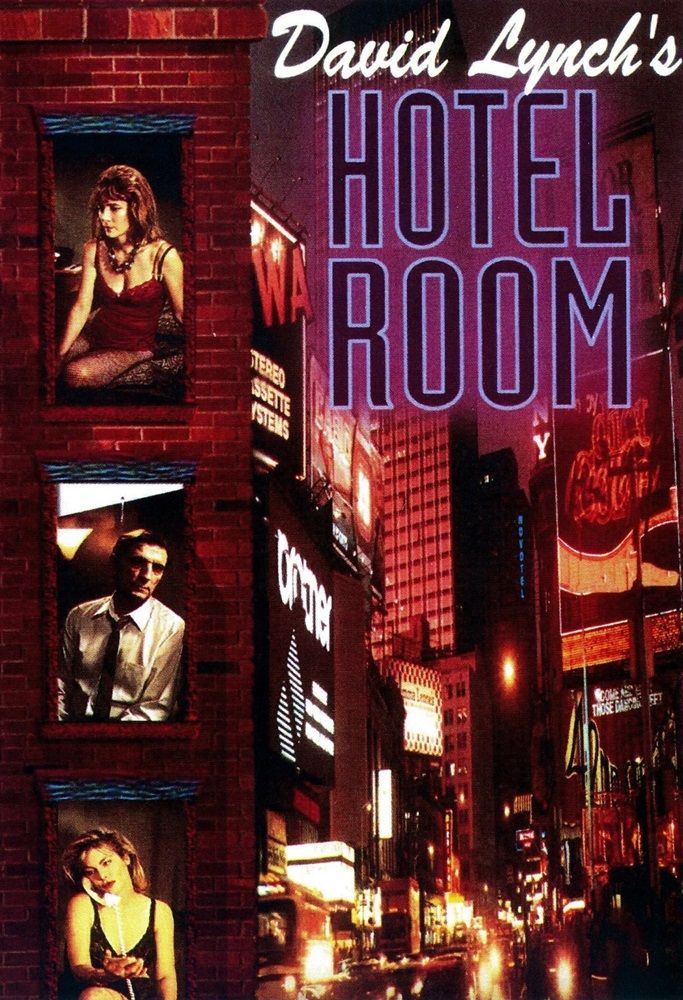
The Big Picture
- The anthology series,
Hotel Room,
is Lynch’s obscure philosophical creation set in an odd hotel, examining existential mysteries in a surreal world. - With haunting themes and eccentric characters, Lynch’s show was too weird for mainstream audiences, leading to its cancellation after three episodes.
-
Hotel Room
provides a window into Lynch’s creepy and abstract universe, blending dialogue-heavy psychological dramas with eerie symbolism.
David Lynch is a name that invokes the mysterious and the all-too-weird. His directorial style and his parody-like personality seem to border on genius and madness. His films are full of strange characters in a strange land, with each frame he shoots swimming in symbolism and each line of dialogue full of supernatural subtext. His films are mystical affairs that invite the audience to explore their deepest inner world and to sit quietly with the unknown. By now, most people know director David Lynch had a show called Twin Peaks that became wildly popular among film enthusiasts and mystery fans. It was a series that was TOO weird to live and was canceled far before its time but has since become a sensation in its own right. The legend of which overshadows a lesser-known series he did for HBO, Hotel Room, that was just as weird (or arguably more so), prompting HBO to cancel it after three episodes.
What Is ‘David Lynch’s Hotel Room’ About?
Hotel Room is a drama Anthology series comprising three half-hour episodes, strung together as a pilot. It aired twice on the HBO network. First, January 8, 1993, with a re-run the following night. Each episode is a story set in a different year with a different cast, but always in Room 603 at the Railroad Hotel in an unseen version of New York City. The show is full of Lynch’s trademark surrealism, including an opening scene where he narrates the philosophical essence of the Hotel Room as an a-priori idea that was caught by man and given shape and form. As he explains, “For a millennium, the space for the hotel room existed, undefined. Mankind captured it, and gave it shape and passed through. And sometimes when passing through, they found themselves brushing up against the secret names of truth.” This narration of the show’s premise is a gift given to the audience by the director. It is a preamble preparing them for a philosophical journey into humanity’s dark and sublime nature.
Every episode takes place entirely within the hotel room, with updated decor befitting whatever year the episode occurs. The only sense of what is outside the room comes from the opening of each episode, which shows a dark and macabre hallway with the signature haunting melodies. Angelo Badalamenti‘s soft but unrelenting jazz soundtrack only adds to the ambiance bubbling under the drama, giving everything that off-kilter feel that Lynch is known to induce in his audience. Take, for example, its inaugural episode, “Tricks,” where a trepidatious and paranoid Moe (Harry Dean Stanton) checks into room 603 with a sex worker named Darlene. Still, they are interrupted by his friend, Lou, who immediately seizes control of the situation. Moe looks timid and sad, a pale figure next to Lou. Darlene reveals she used to be a cheerleader, and Lou insists she performs for them. She does and faints from exertion after the routine. Lou then proceeds to have sex with the woman in front of Moe, who protests but doesn’t do anything to stop the situation.

Related
This Unsettling David Lynch Web Series Was Used in Psychological Research
Experiencing feelings of dread and anxiety? You may want to take Tylenol before watching this 2002 web series.
They sit with the woman for a time, trading strange lines of dialogue more akin to poetry than any real-life conversation. They seem to be plumbing the depths of this poor sex worker’s soul. Moe and Lou accuse her of trying to murder her boyfriend. He seemed to feel slighted and small in her presence. He begins to shout, and the two men attack her. She is saved by a housekeeper who shows up unexpectedly, and the two men bribe the maid to be quiet. Just before Lou leaves, he cautions Moe not to linger. He says it twice just to drive the point home, but Moe decides to sleep instead. Then, a pounding at the door. Moe opens up and finds the police outside. Moe is then arrested in his hotel room for murdering a woman named Phylicia after Lou secretly slips his wallet into Moe’s coat. The police believe that Moe is Lou.
Who is Lou? Did he exist at all? Is he the shadow self of Lou? The real culprit in a twisted murder mystery or the commanding, murdering alter-ego that exists inside this shell of a man? The audience never learns what happens. As the police approach Moe, he cries out in hysterics, protesting his guilt and insisting he is not Lou but, in fact, Moe. How can the audience ever know what was going on? If we are to take Lynch’s pre-amble in the opening credits as a guide, then there is some light in the darkness. The hotel rooms seem to serve as a conduit of truth, where those who pass through its door are given a place to confront some truth about themselves. In this case, and this is only speculation, Moe seems to be an aspect of Lou’s character. He is the unbridled ID of a man who appears to have no control over his life. The drama seems like something sitting on top of something deep and existential, which appears unknowable, but all the clues are there. For Lynch, the film is the thing.
Why Did HBO Cancel ‘David Lynch’s Hotel Room’ After Three Episodes?
The strange and heavy symbolism of David Lynch’s Hotel Room was probably far too esoteric for audiences to bear. There is a lot to unpack in these episodes. There is a banality to the drama, something audiences have seen in countless other shows, but it is somehow turned onto their head and rendered uncomfortably weird. Each episode is like a soap opera replete with over-acting or, in some cases, under-acting. While each episode has a distinct beginning, middle and end, nothing feels resolved. The audience is left wondering what fate befalls the characters. Add to that the compartmentalization of its episodes; there isn’t much of a series. How long could something like that go on for? Nothing connects each episode with the exsection of a philosophical concept far too loose for those who want to kick back and watch a show. Sometimes, people want to be entertained and not to unpack deep philosophical concepts about time and space. Following a lukewarm reception from their audience, they decided to shut down production.
With Lynch, HBO sought a way to capitalize on the success of Tales From The Crypt, an anthology series. But the outright fear and terror of that show is far easier for an audience to digest than the existential dread posited by Lynch in his much sexier and stylish show. What HBO got was a journey down the rabbit hole, and unfortunately for Lynch fans, that just doesn’t translate to a larger audience. As cool as Hotel Room is, much like Twin Peaks, it was just TOO weird to live on, but that does not mean it should be discounted by any means. Fans of the director’s work already know what to expect from him and will surely love spending countless hours debating the show’s philosophical merits, haunting cinematography and deep dive into the essence of truth.







